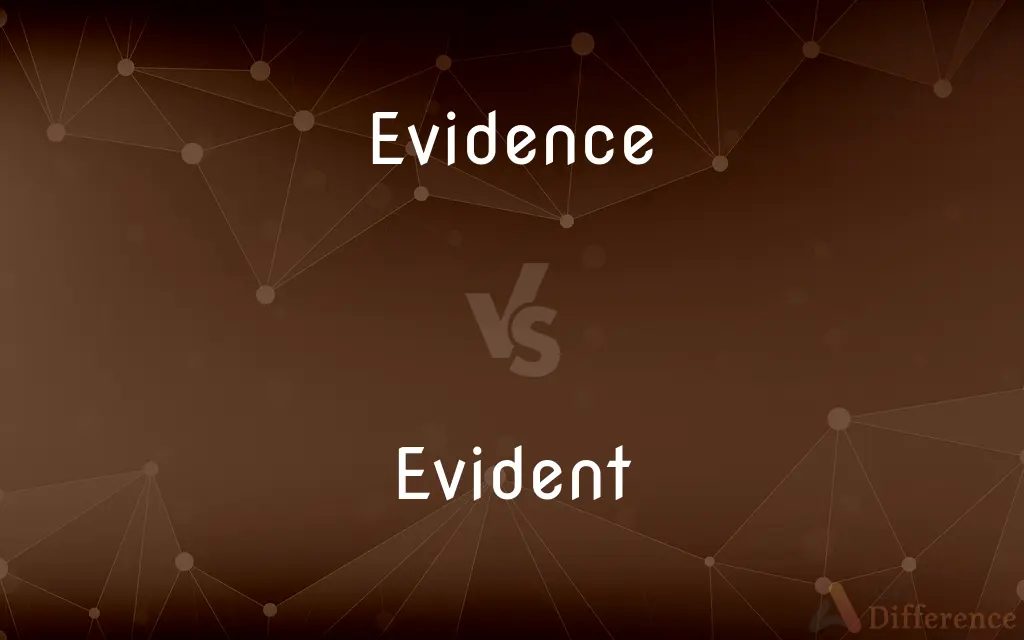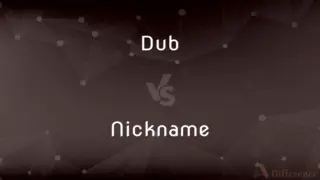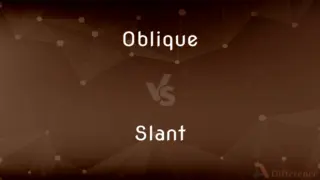Evidence vs. Evident — What's the Difference?
Edited by Tayyaba Rehman — By Fiza Rafique — Updated on March 28, 2024
Evidence is tangible or intangible proof supporting a claim or fact, while evident is an adjective describing something clearly seen or understood.

Difference Between Evidence and Evident
Table of Contents
ADVERTISEMENT
Key Differences
Evidence refers to information, documents, or physical proof that helps to establish the truth or falsehood of a claim in various contexts, such as legal, scientific, or academic. On the other hand, evident is an adjective used to describe something that is obvious or clear to the understanding or perception, without the need for detailed explanation or evidence.
Evidence can come in various forms, including physical objects, witness testimony, documents, and digital data, which are used to support or refute arguments or hypotheses. Whereas evident pertains to qualities or facts that are immediately recognizable or understandable, requiring no additional proof or illustration to be acknowledged.
The role of evidence is crucial in formal processes such as legal trials, academic research, and scientific experimentation, where it is systematically gathered, analyzed, and presented to support a conclusion. On the other hand, something being evident may not require a structured process to be recognized, as its truth or presence is immediately apparent to the senses or reason.
In legal contexts, the term "evidence" is associated with the material presented in court to support or undermine the case being made, governed by strict rules regarding admissibility and relevance. Conversely, "evident" in legal discourse might refer to facts or circumstances that are so clear that they do not require formal evidence to be proven.
Evidence often requires interpretation or analysis to reveal its significance and relevance to the matter at hand, highlighting its role as a building block in the construction of a reasoned argument or theory. Evident, however, suggests a level of clarity and obviousness that makes such processes unnecessary, as the truth or reality of the situation is immediately clear.
ADVERTISEMENT
Comparison Chart
Definition
Material or information indicating whether a belief or proposition is true or valid.
Clearly seen or understood; obvious.
Usage in Context
Used in legal, scientific, and academic fields to support claims.
Used to describe qualities or facts that are obvious without detailed explanation.
Forms
Can be physical objects, documents, data, or testimony.
An adjective describing clarity or obviousness.
Role
To provide proof or support for an argument or theory.
To indicate something is clear or unmistakable.
Requirement
Often requires analysis to determine relevance or truth.
Recognized immediately without need for analysis.
Compare with Definitions
Evidence
Material that proves or disproves something.
The jury examined the evidence carefully before making a decision.
Evident
Easily seen or understood.
It was evident from his expression that he was unhappy.
Evidence
Signs or indications of something.
There is evidence of ancient water flows on Mars.
Evident
Apparent to the mind or senses.
Her talent is evident in her paintings.
Evidence
Testimony or documents used in court.
The lawyer submitted new evidence to the court.
Evident
Obvious or clear without argument.
The solution was evident after the explanation.
Evidence
Data or records supporting scientific research.
The evidence from the study supports the hypothesis.
Evident
Clearly revealed to the sight or understanding.
The truth became evident as the investigation progressed.
Evidence
Information used to support a claim in an argument.
She presented strong evidence to back up her theory.
Evident
Unmistakable.
The quality of craftsmanship is evident in each piece.
Evidence
Evidence for a proposition is what supports this proposition. It is usually understood as an indication that the supported proposition is true.
Evident
Easily perceived or understood; obvious.
Evidence
A thing or set of things helpful in forming a conclusion or judgment
The broken window was evidence that a burglary had taken place. Scientists weighed the evidence for and against the hypothesis.
Evident
Obviously true by simple observation.
It was evident she was angry, after she slammed the door.
Evidence
Something indicative; an indication or set of indications
Saw no evidence of grief on the mourner's face.
Evident
Clear to the vision; especially, clear to the understanding, and satisfactory to the judgment; as, the figure or color of a body is evident to the senses; the guilt of an offender can not always be made evident.
Your honor and your goodness is so evident.
And in our faces evident the signsOf foul concupiscence.
Evidence
The means by which an allegation may be proven, such as oral testimony, documents, or physical objects.
Evident
Clearly apparent or obvious to the mind or senses;
The effects of the drought are apparent to anyone who sees the parched fields
Evident hostility
Manifest disapproval
Patent advantages
Made his meaning plain
It is plain that he is no reactionary
In plain view
Evidence
The set of legal rules determining what testimony, documents, and objects may be admitted as proof in a trial.
Evident
Capable of being seen or noticed;
A discernible change in attitude
A clearly evident erasure in the manuscript
An observable change in behavior
Evidence
To indicate clearly; exemplify or prove
Her curiosity is evidenced by the number of books she owns.
Evidence
Facts or observations presented in support of an assertion.
There is no evidence that anyone was here earlier.
We have enough cold hard evidence in that presentation which will make a world of pain for our parasitic friends at Antarctica.
Evidence
(legal) Anything admitted by a court to prove or disprove alleged matters of fact in a trial.
Evidence
One who bears witness.
Evidence
A body of objectively verifiable facts that are positively indicative of, and/or exclusively concordant with, that one conclusion over any other.
Evidence
(transitive) To provide evidence for, or suggest the truth of.
She was furious, as evidenced by her slamming the door.
Evidence
That which makes evident or manifest; that which furnishes, or tends to furnish, proof; any mode of proof; the ground of belief or judgement; as, the evidence of our senses; evidence of the truth or falsehood of a statement.
Faith is . . . the evidence of things not seen.
O glorious trial of exceeding loveIllustrious evidence, example high.
Evidence
One who bears witness.
Evidence
That which is legally submitted to competent tribunal, as a means of ascertaining the truth of any alleged matter of fact under investigation before it; means of making proof; - the latter, strictly speaking, not being synonymous with evidence, but rather the effect of it.
Evidence
To render evident or clear; to prove; to evince; as, to evidence a fact, or the guilt of an offender.
Evidence
Your basis for belief or disbelief; knowledge on which to base belief;
The evidence that smoking causes lung cancer is very compelling
Evidence
An indication that makes something evident;
His trembling was evidence of his fear
Evidence
(law) all the means by which any alleged matter of fact whose truth is investigated at judicial trial is established or disproved
Evidence
Provide evidence for; stand as proof of; show by one's behavior, attitude, or external attributes;
His high fever attested to his illness
The buildings in Rome manifest a high level of architectural sophistication
This decision demonstrates his sense of fairness
Evidence
Give evidence;
He was telling on all his former colleague
Common Curiosities
What is evidence?
In science, something becomes evident through experimentation, observation, and consensus within the scientific community.
Evidence is material or information that supports or disproves a belief or proposition.
How does something become evident in a scientific context?
How is evidence used in legal contexts?
Yes, evidence can be disputed based on its relevance, accuracy, or admissibility in a legal or factual context.
Evident describes something that is clearly seen or understood without needing proof.
Is eyewitness testimony always reliable evidence?
What does evident mean?
Eyewitness testimony can be unreliable due to factors like memory distortion, making its reliability subject to scrutiny.
What types of evidence are there?
Evidence provides a foundation for informed decision-making by offering proof or disproof of claims.
Yes, something can be evident if it is obvious or clear without requiring formal evidence or proof.
What is the difference between direct and circumstantial evidence?
In legal contexts, evidence is used to support or refute arguments in court, subject to rules of admissibility.
Can evidence be disputed?
Is all evidence tangible?
Clarity and obviousness in communication ensure that messages are easily understood without ambiguity.
No, evidence can also be intangible, such as digital data or witness testimony.
Why is it important for something to be evident in communication?
Can something be evident without evidence?
Direct evidence directly proves a fact, whereas circumstantial evidence implies a fact through an inference.
Can evidence become evident?
Yes, through analysis or presentation, evidence can become evident to prove a point or fact.
Types of evidence include physical objects, witness testimony, documents, and digital data.
How does evidence impact decision-making?
How do you determine if something is evident?
Evidence supports hypotheses and theories in academic and scientific research, providing a basis for conclusions.
Something is considered evident if it is obvious or clear to the understanding or perception without detailed explanation.
What role does evidence play in research?
Share Your Discovery

Previous Comparison
Dub vs. Nickname
Next Comparison
Oblique vs. SlantAuthor Spotlight
Written by
Fiza RafiqueFiza Rafique is a skilled content writer at AskDifference.com, where she meticulously refines and enhances written pieces. Drawing from her vast editorial expertise, Fiza ensures clarity, accuracy, and precision in every article. Passionate about language, she continually seeks to elevate the quality of content for readers worldwide.
Edited by
Tayyaba RehmanTayyaba Rehman is a distinguished writer, currently serving as a primary contributor to askdifference.com. As a researcher in semantics and etymology, Tayyaba's passion for the complexity of languages and their distinctions has found a perfect home on the platform. Tayyaba delves into the intricacies of language, distinguishing between commonly confused words and phrases, thereby providing clarity for readers worldwide.
















































